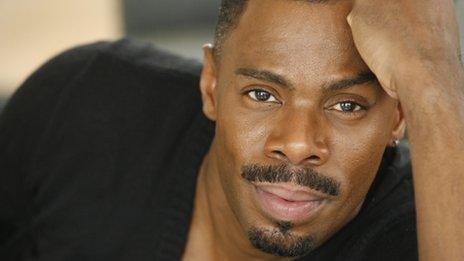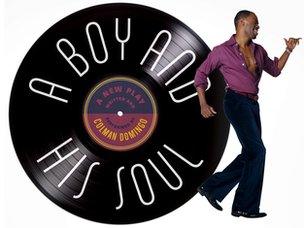Colman Domingo opens his Soul to the UK
- Published

Colman Domingo has won praise as an actor, writer and Broadway musical performer
It is almost a decade since actor Colman Domingo decided to write a one-man play about his experiences growing up in Philadelphia. Now he's about to discover if A Boy and His Soul can strike a chord outside America too. But he's also reminding audiences of the lush delights of the Philly music sound of the 1970s and 1980s.
"If people ask where I'm from usually I won't say Philadelphia, I say West Philadelphia. To me that distinction is important and I'm proud of it."
At 43, Domingo is a success both as an actor and writer. His play Wild with Happy premiered last year at the Public Theater in New York.
As a performer on Broadway he received excellent reviews for performances in the musicals Passing Strange and The Scottsboro Boys. He can be seen in Lee Daniels' new film The Butler.
Domingo has come a long way from his blue-collar roots, but says "West Philly" made him what he is.
That story, dramatised in A Boy and His Soul, found an enthusiastic audience in New York and now is playing at the 235-seat Tricycle Theatre in London.
"The play's about the transitions we all face in life, in this case using music as an important part of the journey. About 80% of what you get on stage is true to my own life and the other 20% is dramatic licence.
"Basically the show is about love and hope. But also it's about grief and how to survive grief."
If that sounds pretty heavy for a one-man 90-minute show, there is humour and music too.
Anyone who loved Philadelphia Soul - or who's prepared to discover it for the first time - will enjoy the many recordings laced through the show.
"Of course partly it was local pride which first attracted me to Philly Soul - but it was also fantastic music. And it still is."

Domingo was working in a bar in New York City while writing A Boy and his Soul
In the 1970s and early 1980s the presiding geniuses of Philadelphia Soul were Kenny Gamble and Leon Huff. The records they produced differed from Berry Gordy's Motown in the lush orchestral sound, usually with a heavy emphasis on strings.
Over the years the roster of stars on Gamble and Huff's Philadelphia International label included Harold Melvin & the Blue Notes, the O'Jays, Teddy Pendergrass, Lou Rawls and Phyllis Hyman. On stage they all get their moment of slightly scratchy vinyl glory.
Coming out
"When I started writing the show I was working in a bar in New York City. It wasn't a great time as both my parents had medical issues and I was struggling as an artist. I was trying to figure out what I was made of.
"So in my downtime I would put on soul music and it would help me write about my life. It wasn't 100% Philly Soul - I loved Michael Jackson too - but a lot of it was.
"In fact when I was a kid I was interested mainly in classical music - maybe I wanted to be different from everyone else and was finding my own voice.
"But then I was lucky enough to see an Earth, Wind and Fire concert and it pushed me in another direction completely. It was life-changing."
One of the themes in the play is Domingo's experience of coming out as gay.
"That's there in the show, but it's a sub-plot. When I first wrote the play the original director asked me where I was in parts of the story. We agreed it needed to be truer to what I had experienced.
"I was trying to find my own way in this working-class house full of men and machismo. So it's partly about how people can learn and appreciate another rhythm in the family - I was that other rhythm.
"In fact there are lots of messages in Philly Soul and often you get elaborate story-telling. So when I heard, say, Teddy Pendergrass sing about being true to yourself it meant something to me. And all that stuff was useful in the show.
Race issues
When Domingo came to London he worried the material might seem too American.
"But Titas Halder [the director] decided there are only minor changes needed. For instance I wondered about a reference to 'row homes' which I understand is not a phrase familiar here.
"But then I was walking near the Tricycle Theatre and I thought wow some of these streets look really like Philly - so probably we will leave it as row homes and not switch to terrace houses or whatever.
"And if the audience doesn't understand every last reference to old American TV shows it really doesn't matter."
Domingo arrived in London before the 50th anniversary of the 1963 March on Washington but he watched coverage of President Obama's speech on TV.
"The original 1963 march was for jobs - and the pity is African-Americans could do with the same thing now in the United States.
"There's a shame attached to our past but we have to deal with it.
"It's something we need to have conversations about at the elementary and junior high school phase. There are many bridges to cross still and places to go.
"I grew up black and working-class in West Philly and I was proud of the place. But much of my old neighbourhood has disintegrated. It's not the same thing it was, It's been toppled over by drugs and crime.
"Yet I'm encouraged too because I think today's kids are a lot more savvy.
"I don't think people have the same hardened attitudes to race they had. But we still have many of the economic problems.
"But the president knows that and America knows it. So maybe there's ways we can help work this out."
A Boy and his Soul is on at London's Tricycle Theatre until 21 September.